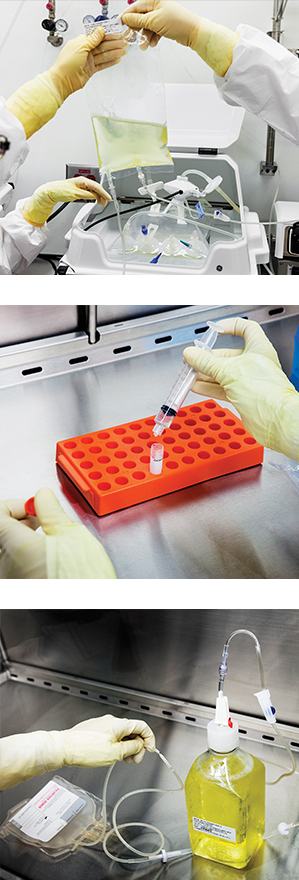MIT Technology Review: A T-Cell Immunotherapy Cure For Cancer


--Read more: http://www.technologyreview.com/featuredstory/538441/biotechs-coming-cancer-cure/When Milton Wright III got his third cancer diagnosis, he cried until he laughed. He was 20 and had survived leukemia twice before, first when he was eight and again as a teen. Each time he’d suffered through years of punishing chemotherapy.
But now he had checked himself in to Seattle Children’s Hospital. An aspiring model, he had taken a fall before a photo shoot and found he couldn’t shake off the pain in his ribs. When the doctors started preparing him for a spinal tap, he knew the cancer was back. “I said, Oh, man, they are going to tell me I relapsed again,” he recalls. “They’re going to give me my six months.”
The third time wasn’t good, he knew. He’d seen enough sick kids at the Ronald McDonald House to know that when leukemia comes back like this, it’s usually resistant to chemotherapy. Hardly anyone survives.
But Wright did. In 2013 his cancer, acute lymphoblastic leukemia, was destroyed with a new type of treatment in which cells from his immune system, called T cells, were removed from his blood, genetically engineered to target his cancer, and then dripped back into his veins. Although Wright was only the second person at Seattle Children’s to receive the treatment, earlier results in Philadelphia and New York had been close to miraculous. In 90 percent of patients with acute lymphoblastic leukemia that has returned and resists regular drugs, the cancer goes away. The chance of achieving remission in these circumstances is usually less than 10 percent.
Those results explain why a company called Juno Therapeutics raised $304 million when it went public in December, 16 months after its founding. In a coup of good timing, the venture capitalists and advisors who established Juno by licensing experimental T-cell treatments in development at Seattle Children’s, the Fred Hutchinson Cancer Research Center, and hospitals in New York and Memphis took the potential cancer cure public amid a historic bull market for biotech and for immunotherapy in particular. Its IPO was among the largest stock market offerings in the history of the biotechnology industry.
The T-cell therapies are the most radical of several new approaches that recruit the immune system to attack cancers. An old idea that once looked like a dead end, immunotherapy has roared back with stunning results in the last four years. Newly marketed drugs called checkpoint inhibitors are curing a small percentage of skin and lung cancers, once hopeless cases. More than 60,000 people have been treated with these drugs, which are sold by Merck and Bristol-Myers Squibb. The treatments work by removing molecular brakes that normally keep the body’s T cells from seeing cancer as an enemy, and they have helped demonstrate that the immune system is capable of destroying cancer. Juno’s technology for engineering the DNA of T cells to guide their activity is at an earlier, more experimental stage. At the time of its IPO, Juno offered data on just 61 patients with leukemia or lymphoma.
Juno is located in South Lake Union, a Seattle neighborhood dominated by Amazon.com, whose CEO, Jeff Bezos, was an early investor in the company. During a day spent at Juno’s labs and offices in May, the phrase I heard repeated over and over was “proof of principle.” That’s what cases like Wright’s have provided. The studies are small, with no control groups, no comparisons, but also no other explanation than T cells for why the cancer disappears. “It’s proved that the T cell is the drug,” says Hans Bishop, a former Bayer executive who is the company’s CEO.
Bishop argues that medicine is entering a new phase in which cells will become living drugs. It is a third pillar of medicine. The pharmaceuticals that arose from synthetic chemistry made up the first pillar. Then, after Genentech produced insulin in a bacterium in 1978, came the revolution of protein drugs. Now companies like Juno are hoping to use our own cells as the treatment. In the case of T cells, the tantalizing evidence is that some cancers could be treated with few side effects other than a powerful fever.
